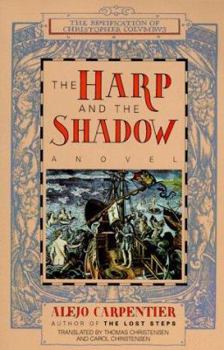The Harp and the Shadow
Select Format
Select Condition 
Book Overview
"An extraordinary display of historical inquisitiveness and stylistic maturity."-The New York Times Book Review Exploring the consequences of the European discovery of the Americas and challenging the... This description may be from another edition of this product.
Format:Paperback
Language:English
ISBN:1562790242
ISBN13:9781562790240
Release Date:January 1992
Publisher:Mercury House
Length:176 Pages
Weight:0.50 lbs.
Dimensions:0.5" x 5.5" x 8.4"
Customer Reviews
3 ratings
excelente novela barroca e ironica ..
Published by Thriftbooks.com User , 23 years ago
Esta obra es un análisis de la vida de Cristóbal Colon, vista desde un punto de vista irónico y divertido a la vez. El autor hace uso del lenguaje barroco y la novela, aunque es corta, parece cargada. La traducción esta muy bien hecha y da un poco de trabajo por todas las palabras que usa Carpentier en el original. La vida de colon es vista desde la perspectiva presente, por un papa que favorece la santificación del marinero para crear una unión entre las iglesias Europeas y Americanas. El segundo capitulo muestra a un hombre movido por la ambición de un oro que parece eludirle en cada viaje y quien después de fallidos intentos ve en el negocio de esclavos el beneficio que tanto le elude. Hacia el final de su vida tenemos un hombre que no desconoce el valor de su gloria, pero se ve plagado, porque quizás no le reconocerán su gloria. Ya el capitulo final, muestra la derrota del personaje al serle negada la canonización. Es un excelente libro, escrito un año antes de la muerte de Alejo Carpentier y que deja ver claramente su estilo barroco y su uso de la lengua española. Es también una excelente traducción al inglesLuis Mendez
repensando a colon
Published by Thriftbooks.com User , 23 years ago
Esta obra es un análisis de la vida de Cristóbal Colon, vista desde un punto de vista irónico y divertido a la vez. El autor hace uso del lenguaje barroco y la novela, aunque es corta, parece cargada. La vida de colon es vista desde la perspectiva presente, por un papa que favorece la santificación del marinero para crear una unión entre las iglesias Europeas y Americanas. El segundo capitulo muestra a un hombre movido por la ambición de un oro que parece eludirle en cada viaje y quien después de fallidos intentos ve en el negocio de esclavos el beneficio que tanto le elude. Hacia el final de su vida tenemos un hombre que no desconoce el valor de su gloria, pero se ve plagado, porque quizás no le reconocerán su gloria. Ya el capitulo final, muestra la derrota del personaje al serle negada la canonización. Es un excelente libro, escrito un año antes de la muerte de Alejo Carpentier y que deja ver claramente su estilo barroco y su uso de la lengua española. Luis Mendez
Rethinking Columbus
Published by Thriftbooks.com User , 24 years ago
Written towards the end of Alejo Carpentier's life, The Harp and the Shadow is both a historical analysis of the Conquest and a personal reflection on fame. Carpentier-the inventor of magical realism, according to Carlos Fuentes-reinterprets Columbus's voyages as driven by greed, not honor. In the second section of book, we visit Columbus on his death bed. As Columbus awaits his confessor, he revisits his first voyages to the Americas, lamenting the fact that, in one section of his diary, he mentions "GOLD" more than two hundred times, while he mentions the Lord God only fourteen times. At the end of the novel, the ghost of Columbus visits his canonization hearing, at which members of the clergy argue for and against the sainthood of Christopher Columbus. As history tells us, the campaign to canonize Columbus failed, largely because he was responsible for initiating the slave trade from the Americas to Europe. Fittingly, the ghost of Columbus is condemned to wander the earth and contemplate his infamy for eternity.This book was published in 1979 as Carpentier's cancer spread. One year later, Carpentier died. Perhaps Carpentier contemplated his own literary fame. His name often circulated as a possible recipient of the Nobel Prize for Literature. Most likely, he never won because of his strong support for the Cuban Revolution. We can still remember Carpentier, however, as someone who helped us better understand the history of the Americas by humanizing Columbus.




